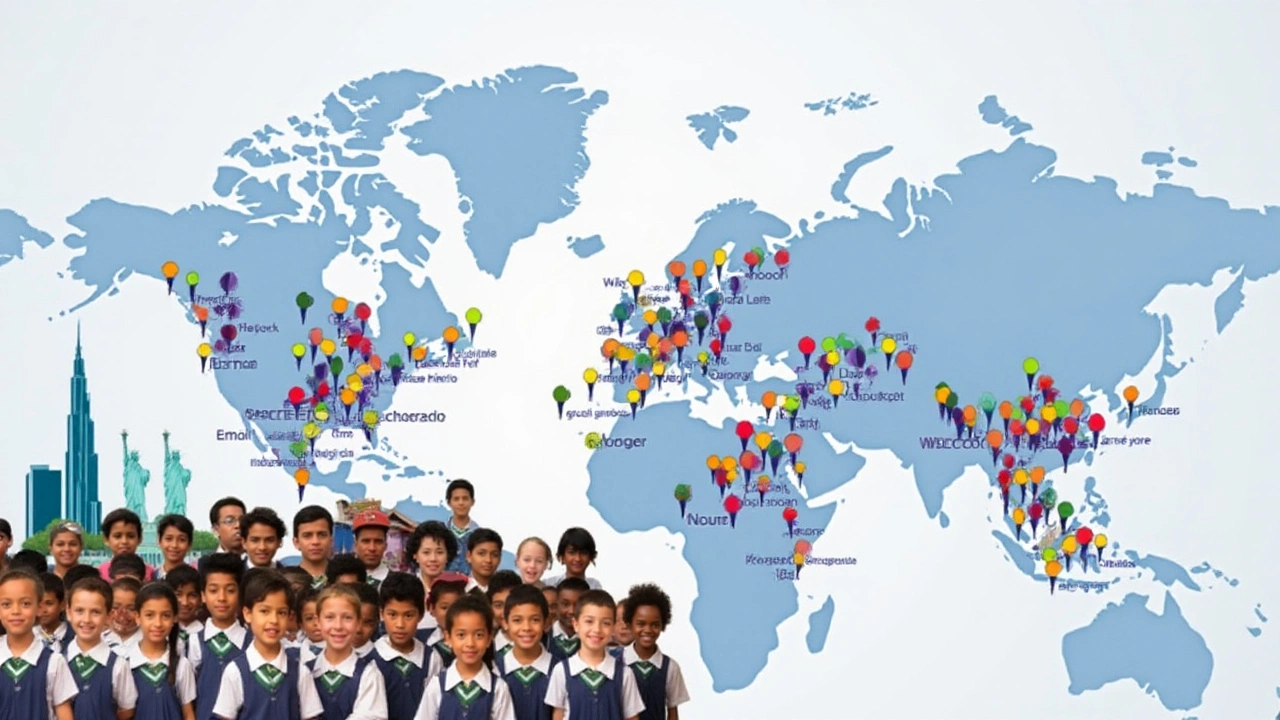
The Central Board of Secondary Education, or CBSE, is a renowned educational framework originating from India. Its reach extends beyond the borders of the country, offering students worldwide the chance to engage in its rigorous academic structure. While many associate CBSE purely with the Indian context, its international presence tells a different story.
Exploring the extent of CBSE's global network reveals how it caters to a diverse pool of students, including Indian expatriates and learners from various cultures. Numerous CBSE-affiliated schools can be found in several countries, addressing the demand for a standardized education system outside India.
In this article, we'll dive into the footprint of CBSE schools abroad, uncovering their benefits and unique adaptations to fit the global stage. Whether you are an Indian family abroad or simply curious about CBSE's international influence, this exploration promises to provide valuable insights.
- CBSE's Global Expansion
- Benefits of Studying CBSE Abroad
- Countries with CBSE Schools
- Adapting to International Standards
- Tips for Parents Seeking CBSE Education
CBSE's Global Expansion
The CBSE curriculum's expansion beyond Indian borders is a fascinating development not only in the realm of education but also in cultural diplomacy. This growth reflects the increasing globalization of education, where academic frameworks transcend national boundaries to offer quality education to a diverse student body. The demand for CBSE abroad initially stemmed from Indian expatriates who desired a seamless continuation of their children's education in a familiar framework as they moved internationally. However, over time, many more parents, both Indian and non-Indian, have acknowledged the value CBSE offers, contributing to its rising popularity worldwide.
Today, numerous countries host schools affiliated with CBSE, with notable concentrations in the Middle East, Southeast Asia, and Africa. Nations like the United Arab Emirates, Singapore, and Kenya have become hubs for CBSE-affiliated schools, catering to families who seek consistency in educational standards amidst geographical shifts. According to the CBSE's official records, there are about 240 CBSE schools in 25 countries outside India. This widespread presence speaks to the board's international recognition and the trust placed in its curriculum.
The Secretary of the Central Board was quoted saying, "CBSE's global presence emphasizes our commitment to delivering accessible and high-quality education to students worldwide, ensuring no matter where they are, they have the opportunity for a cohesive learning experience."
One key element contributing to the successful implementation of the CBSE curriculum abroad is its adaptability. Schools integrating CBSE not only adopt academic standards but also incorporate localized subjects and extracurricular activities that resonate with cultural contexts and prepare students to interact in a global environment. This localized adaptation ensures that while students receive a rigorous education, they're also enriched with perspectives relevant to their immediate environment.
For parents considering a move to a foreign country, the presence of CBSE schools can be a decisive factor. The familiarity of this educational system provides a comfort zone for both parents and children, facilitating an easier transition. The consistency in curriculum means students do not experience gaps or redundancies in their learning journey, a common issue with frequently changing schools or curricula.
The expansion of CBSE abroad is set against a backdrop of growing migration trends, both for career opportunities and personal reasons. As more Indian professionals take up posts in global markets, the demand for authentic Indian educational systems in foreign lands becomes more pronounced. This migration trend underscores the significance of CBSE's offerings outside India and signals its potential for further expansion. Indeed, the CBSE has positioned itself not just as a bridge of scholastic excellence but also as a channel for cultural exchange and mutual understanding across continents.
Benefits of Studying CBSE Abroad
One of the major benefits of studying CBSE abroad is the continuity it offers to students from India who might frequently relocate due to parents’ jobs or other commitments. The CBSE curriculum provides a familiar academic environment rooted in structured learning and standardized testing, ensuring that students can transition seamlessly without disruptions to their educational journeys. This stability is critical, as it allows learners to focus entirely on their academic growth rather than adapting to local education systems whenever a move occurs. Additionally, for students seeking to connect with their cultural roots, CBSE schools often incorporate cultural elements and celebrations into the yearly curriculum, offering a taste of Indian tradition even when thousands of kilometers away from home.
The coursework under the CBSE system places a strong emphasis on STEM education, which is celebrated worldwide for producing competent professionals in fields like engineering and medicine. In an ever-globalizing job market, the skills honed under a rigorous CBSE framework are highly valuable, preparing students for both higher education and professional paths on the international stage. Notably, CBSE's focus on core subjects such as math and science is continually updated to reflect global standards and practices, ensuring relevancy and competitiveness.
According to a study by the World Education Forum, CBSE students exhibit higher adaptability and academic resilience when transitioning between different international academic environments.
Parents often opt for the CBSE curriculum abroad due to its holistic approach, which combines academics with extra-curricular activities, fostering well-rounded development. CBSE schools typically offer a wide array of extracurricular engagements—from music and drama to sports and debate—thereby nurturing varied interests and talents that contribute to a student's all-around capability. This well-rounded education caters not only to academic excellence but also to personal and social development, equipping students with necessary life skills.
Moreover, CBSE schools are known to attract a remarkably diverse student body, creating a unique blend of cultural exchanges and global perspectives. Students can benefit from engaging with peers from different backgrounds, enhancing their intercultural understanding and sensitivity. These schools often host events and activities that celebrate various cultures, offering students invaluable intercultural experiences.
Adapting to Local Environments
International CBSE schools make discerning adaptations to fit into local educational climates, respecting governmental educational policies and requirements where applicable. This flexibility within consistent standards presents a balanced educational experience where students benefit from a blend of global and indigenous methodologies. Such adaptations may include integrating language courses pertinent to the local region or emphasizing learning outcomes specific to regional societal needs, enhancing both local and international student experiences.
This strategy also makes room for important partnerships with local educational bodies and sometimes allows students access to resources and facilities typical to that region while they experience the global society aspect from their CBSE curriculum. By weaving together local culture and international standards, CBSE schools abroad create a robust and welcoming environment for students worldwide, offering educational opportunities that are as diverse as they are rich.

Countries with CBSE Schools
The CBSE's global reach is quite expansive, spanning several continents and offering a familiar academic system to Indian expatriates as well as local students. One of the early adopters of the CBSE curriculum outside India was the United Arab Emirates, where it remains incredibly popular. Several schools specifically cater to the Indian diaspora with the CBSE curriculum, making it possible for Indian students to seamlessly transition between schools if families relocate. The UAE hosts a robust network of CBSE schools, providing students with the same rigorous standards and examinations they would find in India.
In Singapore, an economic hub with a diverse expatriate community, CBSE schools are an appealing choice for many Indian families. The CBSE schools in Singapore offer a structured curriculum that embeds an understanding of both Indian and global contexts, beneficial for students worldwide. Parents value the holistic approach these schools take, integrating cultural studies with science and mathematics. This offers a unique advantage, as students can gain a broad perspective while maintaining a connection to their Indian roots.
Another noteworthy location is Qatar, where the influx of Indian professionals has seen a corresponding growth in demand for CBSE-affiliated schools. The schools here are known for adhering closely to the standards set by CBSE, ensuring that the quality of education is maintained. These institutions offer opportunities for co-curricular development alongside academics, preparing students for both national and international examinations. This atmosphere nurtures well-rounded individuals equipped to tackle global challenges.
In more recent developments, Australia has also embraced CBSE schools, catering to the educational needs of Indian-origin families. These institutions often boast state-of-the-art facilities and foster a multicultural environment where Indian and Australian cultures intersect. It's an educational landscape that encourages inclusivity while retaining the integrity of the Indian curriculum. The learning experiences in these schools are enriched with local insights, giving students a valuable dual exposure.
According to an educator at a leading CBSE school in Dubai, "Our curriculum not only mirrors the syllabi taught in India, but we also integrate local context into our lessons, which helps students relate better to their environment."
In Kenya, a growing Indian community has led to the establishment of several CBSE schools. These schools highlight the flexibility and reach of the CBSE framework, which can adapt to varied cultural settings. Kenyan CBSE schools often participate in regional educational networks, allowing them to maintain a competitive edge in local and international educational standards. They focus on fostering global citizens who are deeply rooted in their cultural identities.
Adapting to International Standards
When the CBSE abroad is considered, one important feature that comes to light is its adaptation to international standards. As the board extends out from the Indian subcontinent, it's essential for the curriculum to reflect a global perspective that resonates with diverse learners across the world. This adaptation process ensures that CBSE schools not only maintain high academic standards but also cater to the cultural, linguistic, and educational nuances of the countries they operate in. A significant aspect of this adaptation involves incorporating broader curricular improvements without sacrificing the core principles that define the CBSE framework. This includes ensuring that subjects are taught with an international outlook, taking into account different historical, geographical, and cultural perspectives.
The schools must also adhere to local education regulations while simultaneously maintaining the integrity of the CBSE ethos. For instance, schools often incorporate regional languages and social studies pertinent to their locations alongside the standard CBSE subjects. This dual approach not only helps in preserving local relevance but also contributes to the holistic development of a student. Such a curriculum prepares students to be globally competitive while staying rooted in their cultural identity.
In a quote from an education expert at UNESCO, it is noted that,
"The ability of an educational system to adapt without losing its identity is key to its success in a foreign land."This sentiment echoes through the policies adopted by CBSE schools worldwide, with many embracing innovative teaching methodologies and diverse assessment techniques to match international standards. Modern teaching techniques often emphasize critical thinking, problem solving, and creativity over rote learning, which aligns well with global education trends and teaching strategies. These methods foster an environment where students are encouraged to explore and question, leading to a more profound understanding of the subject matter.
Another crucial aspect of adapting to international standards is incorporating technology into the classroom. The technological infrastructure in many countries sets a high benchmark, making it imperative for CBSE schools to integrate digital tools for teaching and learning. From smartboards to online resources and virtual classrooms, the use of technology in CBSE schools enhances the learning experience, provides students with a global view, and prepares them for a world that is increasingly reliant on technology. They can interact with students across borders through digital learning platforms, enabling a more comprehensive and enriched education experience.
This technical integration aids in creating a seamless, borderless classroom environment, which is crucial in today's interconnected world. CBSE's ability to remain dynamic and flexible in its approach allows it to deliver a curriculum that meets international benchmarks while still being uniquely efficient in its educational delivery. Through partnerships with educational organizations worldwide, CBSE schools often bring in guest instructors and experts that provide insights into a variety of professional fields and cross-cultural themes. These partnerships not only enhance the learning environment but also broaden students' horizons, preparing them for global opportunities in a rapidly evolving job market.
To illustrate this adaptation further, here's a breakdown of some initiatives:
- Introduction of international cultural exchanges and excursions as part of the curriculum.
- Flexible assessment systems that accommodate diverse student needs and aspirations.
- Collaborations with local and international educational bodies for expanded learning opportunities.
Such efforts underline the adaptability and commitment of CBSE to providing a robust, internationally competitive education to students, enabling them to thrive both abroad and within their native country.

Tips for Parents Seeking CBSE Education
Choosing the right education for your child is a decision that carries significant weight, especially when considering an international option like the CBSE abroad. It's crucial for parents to evaluate various factors to ensure their children can thrive within a global version of an Indian curriculum. One important step is understanding the specific needs of your child. Does your child excel in structured learning environments, or do they thrive in more creative settings? CBSE's focus on a cohesive and cumulative educational approach can be highly beneficial for students who require a strong foundational framework to build on.
Understandably, culture and environment play a significant role in a child's educational journey. Therefore, parents should consider how the culture of a CBSE school abroad navigates both local values and Indian traditions. As some CBSE schools actively integrate cultural programs that celebrate important Indian festivals, they help Indian expatriate children feel a sense of belonging, while also providing local children with a rich, multicultural experience. It's worthwhile to visit potential schools if possible, allowing you to gauge their multicultural environment. This gives insights not just into the educational aspects, but also into how the school community might nurture your child’s growth.
A 2022 report by the Indian Ministry of Education noted, "International CBSE schools maintain the dual objectives of preserving Indian culture while embracing diversity and internationalism."
Financial considerations also cannot be overlooked. While many parents are ready to invest in their child's future, understanding the fee structure and what is included in tuition fees at a CBSE institution abroad is important. Consider whether the school provides extras like technology access or extracurricular activities within the fee, or if there are hidden costs in the form of uniforms, excursions, or administrative fees. It's equally important to learn about scholarships or financial aid opportunities that might be accessible to help alleviate costs.
Language proficiency is another critical element. Parents need to evaluate the language of instruction used within CBSE schools, especially when enrolling in countries where English might not be the predominant language. Fortunately, most CBSE schools do offer multilingual environments where subjects are taught in English. Additionally, the ability to learn regional languages may enrich a child's learning experience and prepare them for wider communication skills.
Lastly, engage with teachers and administrative staff through consultations or open houses, which many schools conduct before the start of an academic session. This will help you better understand the school's philosophies and teaching methods. These interactions also provide a platform for parents to ask specific questions related to curriculum changes, student-teacher ratios, support systems, and other concerns they may have. An informed decision developed through these multispectral considerations will enhance your likelihood to choose an institution that aligns with both the educational aspirations and the lifestyle goals you hold for your child.
